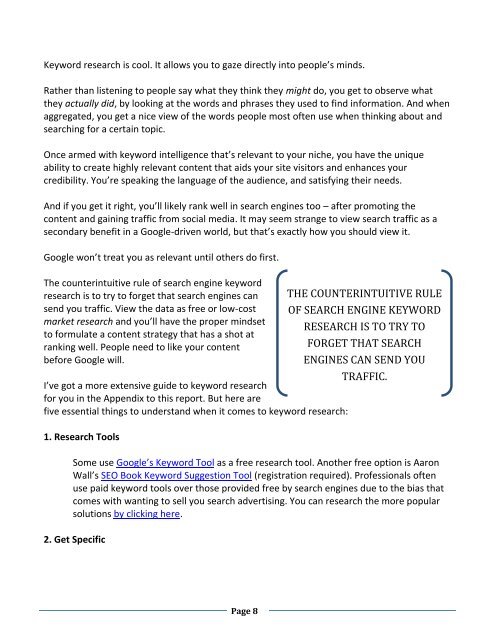How to Create Compelling Content
How to Create Compelling Content That Ranks Well in Search Engines This free 27-page report by Copyblogger founder Brian Clark provides you a step-by-step strategy for creating content that scores links, is highly readable and engaging, and ranks well in
How to Create Compelling Content That Ranks Well in Search Engines This free 27-page report by Copyblogger founder Brian Clark provides you a step-by-step strategy for creating content that scores links, is highly readable and engaging, and ranks well in
Create successful ePaper yourself
Turn your PDF publications into a flip-book with our unique Google optimized e-Paper software.
Keyword research is cool. It allows you <strong>to</strong> gaze directly in<strong>to</strong> people’s minds.<br />
Rather than listening <strong>to</strong> people say what they think they might do, you get <strong>to</strong> observe what<br />
they actually did, by looking at the words and phrases they used <strong>to</strong> find information. And when<br />
aggregated, you get a nice view of the words people most often use when thinking about and<br />
searching for a certain <strong>to</strong>pic.<br />
Once armed with keyword intelligence that’s relevant <strong>to</strong> your niche, you have the unique<br />
ability <strong>to</strong> create highly relevant content that aids your site visi<strong>to</strong>rs and enhances your<br />
credibility. You’re speaking the language of the audience, and satisfying their needs.<br />
And if you get it right, you’ll likely rank well in search engines <strong>to</strong>o – after promoting the<br />
content and gaining traffic from social media. It may seem strange <strong>to</strong> view search traffic as a<br />
secondary benefit in a Google-driven world, but that’s exactly how you should view it.<br />
Google won’t treat you as relevant until others do first.<br />
The counterintuitive rule of search engine keyword<br />
research is <strong>to</strong> try <strong>to</strong> forget that search engines can<br />
send you traffic. View the data as free or low-cost<br />
market research and you’ll have the proper mindset<br />
<strong>to</strong> formulate a content strategy that has a shot at<br />
ranking well. People need <strong>to</strong> like your content<br />
before Google will.<br />
TRAFFIC.<br />
I’ve got a more extensive guide <strong>to</strong> keyword research<br />
for you in the Appendix <strong>to</strong> this report. But here are<br />
five essential things <strong>to</strong> understand when it comes <strong>to</strong> keyword research:<br />
1. Research Tools<br />
Some use Google’s Keyword Tool as a free research <strong>to</strong>ol. Another free option is Aaron<br />
Wall’s SEO Book Keyword Suggestion Tool (registration required). Professionals often<br />
use paid keyword <strong>to</strong>ols over those provided free by search engines due <strong>to</strong> the bias that<br />
comes with wanting <strong>to</strong> sell you search advertising. You can research the more popular<br />
solutions by clicking here.<br />
2. Get Specific<br />
Page 8<br />
THE COUNTERINTUITIVE RULE<br />
OF SEARCH ENGINE KEYWORD<br />
RESEARCH IS TO TRY TO<br />
FORGET THAT SEARCH<br />
ENGINES CAN SEND YOU

















